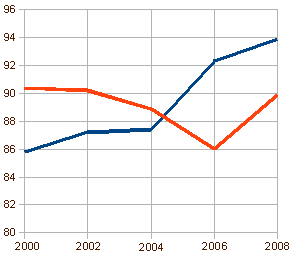Every President’s early months in office are shaped by circumstances and policies inherited from his predecessor. But few presidencies have enjoyed opening acts in which the previous administration loomed as large as the Bush record has in the first three months of the Obama era. Every time a media organization promises a summing-up of "Barack Obama’s First One Hundred Days," the headline should have an asterisk attached: *Brought To You By George W. Bush.
Neophyte presidents have inherited unfinished wars before: Dwight Eisenhower was elected to end the conflict in Korea; Richard Nixon beat Hubert Humphrey while pledging to extract us from Vietnam; and even Bill Clinton was bequeathed an ongoing military operation in Somalia, which turned sour early in his presidency. They’ve inherited economic crises: Ronald Reagan took over amid stagflation; FDR was elected at the bottom of the Great Depression. And they’ve been asked to pass judgment, with a certain amount of finesse, on their predecessors’ extra-legal excesses – think of Gerald Ford pardoning Nixon in the wake of Watergate, or Warren Harding undoing Woodrow Wilson’s forays into wartime authoritarianism.
But Barack Obama hit the trifecta. He’s inherited two ongoing military conflicts; he’s responsible for managing a global financial crisis that began on his predecessor’s watch; and he spent last week trying to pick his way through the political-legal minefield created by the Bush Administration’s interrogation policies. As a result, across an eventful three months in office, the events of greatest consequence – the stimulus bill, the strategizing around Afghanistan and Iraq, and the ongoing efforts to bail out and prop up America’s banking and automobile industries – have all been continuations, revisions, and responses to Bush-era policy and Bush-era crises…
Even in the case of interrogation policy, where Obama may pay a small political price for the decision to release the "torture memos," his path was smoothed by choices that George W. Bush had already made. The fact that the Bush Administration had acknowledged the use of waterboarding and allowed the Red Cross access to high-value detainees enabled Obama to plausibly claim that he wasn’t revealing any information whose secrecy hadn’t been essentially compromised already.
None of these examples are intended minimize the overall success, in political terms, of Obama’s first three months in office, or the finesse with which he’s handled a variety of difficult issues. But his administration has only just begun to define itself, and things will almost certainly get harder as the shadow of the Bush Administration recedes. The policy debates for which this administration will be remembered are still ahead of it, and the crises and the defining moments they generate are still to come as well. In a variety of different ways, George W. Bush helped make Barack Obama’s first hundred days a ringing success. But he won’t be there to help forever.
The Republicans ostracized and damned Arlen Specter for daring to vote with the Democrats on the Stimulus Bill, and participated in ensuring his defeat in the next election, then howled at the top of their lungs when he left the Party – calling him a traitor. That’s the point that I’m actually thinking about as I write this. It’s possible that it feels that way to me because it’s the other side of the aisle for me, because if you look at the Democratic Senators, a lot of them vote the Party line too. This is the percentage of Senators voting along Party lines since 2000:

I’m trying to think back to see if this level of Party divisiveness stretches back linearly into all time. Now that I think about it, it seems like it does – at least in my lifetime. I was in college through the brief Kennedy years and paid little attention. Johnson had large Congressional Majorities, so it wasn’t as apparent – though the opposition to his "great society" was at times vicious. But since then, I’ve paid more attention, and in retrospect, the Party divide doesn’t feel like it ever really lets up. And I’ll admit that the above graph surprises me a bit. I want to make excuses for the unanimous Democrat voting, but the only one I can think of is, "They were right." That’s not much of a defense and I expect there are a bunch of Republicans saying the exact same thing right now.

Interesting graphing. I tend to think, too, that it’s all about voting for good legislation and that Democrats usually vote for the good stuff, and sometimes a few Republicans do too. That would explain Democrats seeming more “party-line” — it’s just that they have a better record of voting for good legislation.
But, of course, I’m sane enough to recognize my bias also.
By the way, the author of this article, Ross Douthat, is the new conservative columnist that the NY Times has hired to replace silly, always-wrong Bill Kristol. So here we have the designated conservative voice acknowledging bush’s terrible legacy.